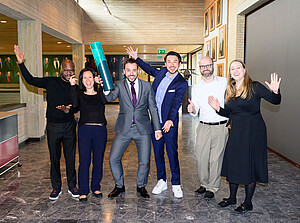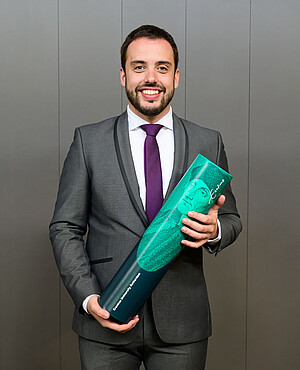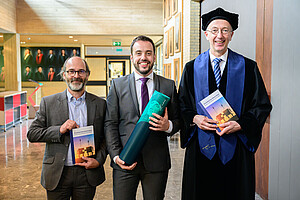PhD Defence Guillem Casoliva Cabana

Unethical behaviour by employees remains a formidable challenge for organizations well into the 21st century, and it is still regrettably common in the workplace: from private, public, to non-governmental. In his dissertation, Unravelling Team Ethical Culture: The Existence, Relevance and Implications for Ethics Management, ERIM's Guillem Casoliva Cabana explored the role of team ethical culture (TEC) in the prevention of unethical behaviour. His dissertation aims to improve our understanding of TEC and its role in designing an ethics program effective at preventing unethical behaviour. Overall, this dissertation’s novelty in the study of ethical culture is the use of one organization as a case study, while contributing to a better understanding of the effectiveness of ethics programs in preventing unethical behaviour across teams.
Guillem defended his dissertation in the Senate Hall at Erasmus University Rotterdam (EUR) on Thursday, 18 April at 13:00. His supervisors were Prof. dr. Muel Kaptein (EUR) and Prof. dr. Wim Vandekerckhove (EDHEC). Other members of the Doctoral Committee were Dr. Ann Tenbrunsel (University of Notre Dame), Prof. dr. Marius van Dijke (EUR), Prof. dr. Michaéla Schippers (EUR), Prof. dr. Agnes Akkerman (University of Amsterdam), and Prof. Jeroen Maesschalck (KU Leuven).
About Guillem Casoliva-i-Cabana

Guillem Casoliva Cabana is a compliance manager at Booking.com. He obtained his PhD at the Erasmus University Rotterdam School of Management, under the supervision of Professor Muel Kaptein and Professor Wim Vandekerckhove. After completing his Masters in Corporate Communication and Reputation Management at Alliance Manchester Business School (2013), Guillem started working for Booking.com in 2014. Guillem’s research focuses on ethical cultures at team level, and the importance of understanding team-level cultures for enhancing the effectiveness of ethical programs in preventing unethical behaviour.
Thesis Abstract

Unethical behaviour by employees remains a formidable challenge for organizations well into the 21st century, and it is still regrettably common in the workplace. Scandals around unethical behaviour continue to surface in all types of organizations: private, public, and non-governmental. Despite the growing adoption of ethics programs to prevent unethical behaviour, the headlines about such scandals and the surveys that have been conducted in the workplace consistently indicate its high prevalence worldwide.
This dissertation studies the role of team ethical culture (TEC) in the prevention of unethical behaviour. The studies comprising this dissertation aim to improve our understanding of TEC and its role in making an ethics program effective at preventing unethical behaviour. The first study researches the existence of different TEC within an organization and its relevance in preventing unethical behavior and the responses to it (e.g., reporting to managers, or remaining silent). The second study explores the mediating role of TEC in the relationship between a well-implemented ethics program and unethical behaviour. Finally, the third and fourth studies investigate both the ethics programs and TEC as multidimensional constructs and explore the TEC dimensions (pathways) through which the components of ethics programs influence unethical behaviour. Overall, this dissertation’s novelty in the study of ethical culture is the use of one organization as a case study, while contributing to a better understanding of the effectiveness of ethics programs in preventing unethical behaviour across teams.
View photos of Guillem's PhD Defence
Photos: Rick Keus / Rick Keus Fotografie


